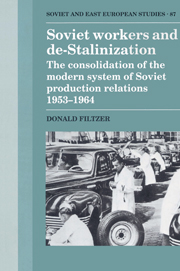 Soviet Workers and De-Stalinization
Soviet Workers and De-Stalinization Published online by Cambridge University Press: 29 January 2010
In the introduction it was argued that one of the central contradictions facing the Soviet elite in the Khrushchev period was that, to effect any substantive rejuvenation of the economy, it had to restructure the labour process, yet it proved unable to develop any coherent, strategy for accomplishing this task. Instead, as has been shown in Part I, the main areas of labour policy attempted to impose changes on worker behaviour indirectly, by enhancing the elite's control over labour mobility and the incentives system. By failing to come to grips with the problem of the labour process, however, its success in these other spheres remained extremely limited. What control it did gain, for example over general levels of wage-spending and the imposition of tighter norms for production workers in engineering, caused so much knock-on disruption in the rest of the economy that these policies had to be rescinded by Khrushchev's successors.
On this analysis it might seem that, had the elite mounted a head-on confrontation with both managers and workers over the question of control of the labour process, it might have been able to achieve the restructuring it required and to enhance its control over the surplus. Such a conclusion would, in my view, be wrong. From a strictly empirical standpoint, during the 1930s the Stalinist elite was constantly at war with the working class over the labour process. The mass campaigns of shock work, and even more so Stakhanovism, were designed precisely to resolve this issue, and yet they failed to bring about the changes that were intended.
To save this book to your Kindle, first ensure no-reply@cambridge.org is added to your Approved Personal Document E-mail List under your Personal Document Settings on the Manage Your Content and Devices page of your Amazon account. Then enter the ‘name’ part of your Kindle email address below. Find out more about saving to your Kindle.
Note you can select to save to either the @free.kindle.com or @kindle.com variations. ‘@free.kindle.com’ emails are free but can only be saved to your device when it is connected to wi-fi. ‘@kindle.com’ emails can be delivered even when you are not connected to wi-fi, but note that service fees apply.
Find out more about the Kindle Personal Document Service.
To save content items to your account, please confirm that you agree to abide by our usage policies. If this is the first time you use this feature, you will be asked to authorise Cambridge Core to connect with your account. Find out more about saving content to Dropbox.
To save content items to your account, please confirm that you agree to abide by our usage policies. If this is the first time you use this feature, you will be asked to authorise Cambridge Core to connect with your account. Find out more about saving content to Google Drive.